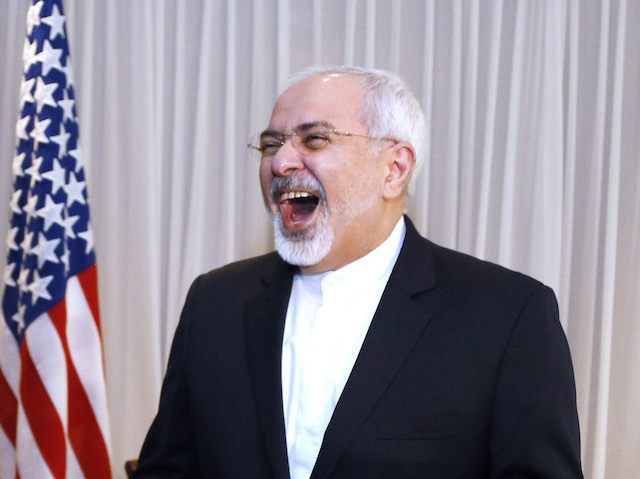President Donald Trump is reportedly preparing Friday to extend sanctions relief to Iran, affirming one of the key provisions of the Iran deal that President Barack Obama struck in July 2015.
In the interim, the White House is issuing firm-sounding statements on the ongoing Iranian protests, and congressional Republicans are preparing largely cosmetic legislative fixes to the deal.
But practically, Trump’s position is unchanged from Obama’s.
Last October, President Trump declined to re-certify Iranian compliance with the Iran deal, kicking responsibility for fixing the deal to Congress. The Trump administration also complained loudly in December about Iran’s ballistic missile program, citing a United Nations report that suggested Iran was ignoring calls to stop.
And over the past few weeks, the president has been vocal in his support for anti-regime protests in Iran — unlike his predecessor. The administration may even apply new human rights sanctions against Iran in response to the ongoing crackdown.
But as long as Trump does not re-impose the sweeping sanctions that brought Iran to the negotiating table — which the Obama administration opposed, before later taking credit for them — the deal will remain intact. And Iran will continue to develop its nuclear capabilities — albeit more slowly — in preparation for the date when the deal expires.
Part of the problem is the way that Obama and the other signatories — China, Russia, Germany, France, and the UK — gave Iran all of the benefits of the deal up front, such as sanctions relief and billions of dollars, while leaving the enforcement of the deal’s nuclear provision until much later in the process. The “snap-back” provisions of the deal, which theoretically allow the UN Security Council to punish Iran for noncompliance, will be impossible to invoke.
The Iran deal also fails to address Iran’s support for terrorism in the region and around the world; its involvement in global crime syndicates; and its appalling repression of its own people.
Moreover, the Obama administration sold the deal as if it would deal with the missiles to which Iran hopes one day to attach nuclear warheads. But it does not, and the UN Security Council merely called upon Iran to stop its missile program without forcing it to do so.
Perhaps most important of all, international nuclear inspectors have not bothered to check military sites, where Iran is suspected of having conducted nuclear activity in the past. And Obama’s deal does not require Iran to open them.
The problem is the Iran deal itself. Trump came into office promising, alternatively, to enforce the deal rigidly or to cancel it. Either way would require, eventually, that he reimpose the old sanctions, at least unilaterally (the rest of the world, waist-high in deals with regime, would resist).
But that might lead to a rapid escalation, as Iran would restore its nuclear research and development to full capacity — from a stronger position, financially and militarily.
Outgoing Senator Bob Corker (R-TN), who smoothed the way for the Iran deal’s adoption by passing the misnamed Iran Nuclear Agreement Review Act, is warning that canceling the Iran deal could also make North Korea reluctant to negotiate.
Though South Korean President Moon Jae-in has credited President Trump and his aggressive style for the re-opening of bilateral talks with North Korea this week, Sen. Corker still believes a softer approach is better.
And so, essentially, President Trump may be about to adopt President Obama’s posture on Iran’s nuclear ambition, with the approval of the Beltway establishment, who hope to defer the moment of reckoning as long as possible.
Joel B. Pollak is Senior Editor-at-Large at Breitbart News. He was named to Forward’s 50 “most influential” Jews in 2017. He is the co-author of How Trump Won: The Inside Story of a Revolution, is available from Regnery. Follow him on Twitter at @joelpollak.

COMMENTS
Please let us know if you're having issues with commenting.